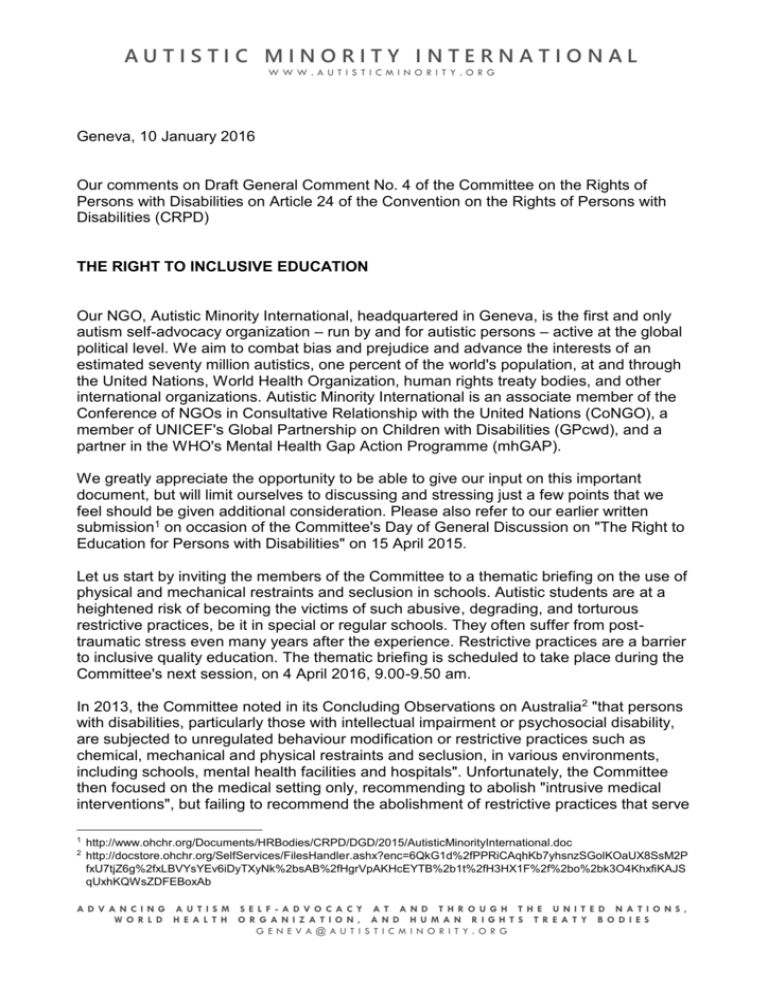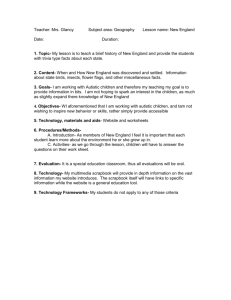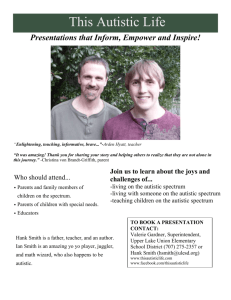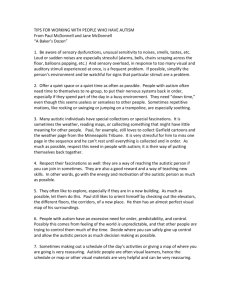Autistic Minority International
advertisement

AUTISTIC MINORITY INTERNATIONAL WWW.AUTISTICMINORITY.ORG Geneva, 10 January 2016 Our comments on Draft General Comment No. 4 of the Committee on the Rights of Persons with Disabilities on Article 24 of the Convention on the Rights of Persons with Disabilities (CRPD) THE RIGHT TO INCLUSIVE EDUCATION Our NGO, Autistic Minority International, headquartered in Geneva, is the first and only autism self-advocacy organization – run by and for autistic persons – active at the global political level. We aim to combat bias and prejudice and advance the interests of an estimated seventy million autistics, one percent of the world's population, at and through the United Nations, World Health Organization, human rights treaty bodies, and other international organizations. Autistic Minority International is an associate member of the Conference of NGOs in Consultative Relationship with the United Nations (CoNGO), a member of UNICEF's Global Partnership on Children with Disabilities (GPcwd), and a partner in the WHO's Mental Health Gap Action Programme (mhGAP). We greatly appreciate the opportunity to be able to give our input on this important document, but will limit ourselves to discussing and stressing just a few points that we feel should be given additional consideration. Please also refer to our earlier written submission1 on occasion of the Committee's Day of General Discussion on "The Right to Education for Persons with Disabilities" on 15 April 2015. Let us start by inviting the members of the Committee to a thematic briefing on the use of physical and mechanical restraints and seclusion in schools. Autistic students are at a heightened risk of becoming the victims of such abusive, degrading, and torturous restrictive practices, be it in special or regular schools. They often suffer from posttraumatic stress even many years after the experience. Restrictive practices are a barrier to inclusive quality education. The thematic briefing is scheduled to take place during the Committee's next session, on 4 April 2016, 9.00-9.50 am. In 2013, the Committee noted in its Concluding Observations on Australia2 "that persons with disabilities, particularly those with intellectual impairment or psychosocial disability, are subjected to unregulated behaviour modification or restrictive practices such as chemical, mechanical and physical restraints and seclusion, in various environments, including schools, mental health facilities and hospitals". Unfortunately, the Committee then focused on the medical setting only, recommending to abolish "intrusive medical interventions", but failing to recommend the abolishment of restrictive practices that serve 1 2 http://www.ohchr.org/Documents/HRBodies/CRPD/DGD/2015/AutisticMinorityInternational.doc http://docstore.ohchr.org/SelfServices/FilesHandler.ashx?enc=6QkG1d%2fPPRiCAqhKb7yhsnzSGolKOaUX8SsM2P fxU7tjZ6g%2fxLBVYsYEv6iDyTXyNk%2bsAB%2fHgrVpAKHcEYTB%2b1t%2fH3HX1F%2f%2bo%2bk3O4KhxfiKAJS qUxhKQWsZDFEBoxAb ADVANCING AUTISM SELF-ADVOCACY AT AND THROUGH THE UNITED NATIONS, WORLD HEALTH ORGANIZATION, AND HUMAN RIGHTS TREATY BODIES GENEVA@AUTISTICMINORITY.ORG AUTISTIC MINORITY INTERNATIONAL W W W . A U T I S T I C M I N O R I T Y . O R G no pretended medical purpose – but rather aim to discipline students, manage their behaviour, and enforce compliance – in schools. The General Comment is an opportunity to rectify that omission. We urge the Committee to add a paragraph (following on from paragraph 50) rejecting the use of restrictive practices, restraints and seclusion in both special and regular schools. Our thematic briefing on the subject will contribute to the #EndViolence against Children and Adolescents with Disabilities campaign3, launched on 3 December 2015 by GPcwd's Task Force on Child Protection, of which we are a member, UNICEF, UNFPA, the Global Partnership to End Violence against Children, the Special Representative of the Secretary-General on Violence against Children, the Special Rapporteur on the Rights of Persons with Disabilities, and the International Disability Alliance (IDA). We look forward to Committee members' participation. Paragraph 16: Here, as in other places throughout the General Comment, it might be advantageous to stress that "impairments" may be actual or perceived. Too often, the educational opportunities on offer to autistic students are limited not by actual impairment, but by how autism is (wrongly) perceived in the public opinion and by the faulty assumption that all autistic students are the same rather than part of a wide spectrum of needs, challenges, and abilities that require individualized accommodation and support. Paragraph 17 says that "assistance [...] should be free of charge at the primary level", while paragraph 19 recalls the requirement that "persons with disabilities can access inclusive, quality and free primary and secondary education on an equal basis with others". Surely, this mandates that assistance must be provided free of charge at the primary and secondary levels? Please change paragraph 17 accordingly. Paragraph 26: Maybe there is a better way to express "responding to the voices of persons with disabilities", as it may be interpreted to discriminate against persons who do not speak, and whose "voices" are not as easy to be heard, such as non-verbal autistics. Paragraph 27: We recommend that every school and classroom should be "accessible via information communication technology", as this is part of Universal Design for autistic students who may otherwise be disadvantaged by having to share a physical space with large groups of other students. A physical presence requirement acts as a barrier for many autistic students and hinders their educational progress. Autistic students should be able to choose when to attend class in person and when to participate online, via ICT. Article 34: We are concerned that this paragraph, by singling out blind, deaf, and deafblind persons, may lead States Parties to conclude that other groups of persons with disabilities do not experience the same levels of failure "to make appropriate provisions for children [...] to acquire the life and social skills essential for participation in education and within their communities". For instance, many autistic persons also live with sensory processing disorder. They, too, may require "augmentative and alternative modes, means and formats of communication" and will benefit from "[p]eer support [...] schemes". Autistic students who do not speak may equally be using sign language instead4. The 3 4 http://www.gpcwd.org/endviolence.html http://www.nationalautismresources.com/sign-language-and-autism.html 2 AUTISTIC MINORITY INTERNATIONAL W W W . A U T I S T I C M I N O R I T Y . O R G autistic community also has a "cultural and linguistic identity" that must be recognized and supported. Autistic culture deserves to be highlighted alongside deaf culture. Autistic students, too, "must be provided with education delivered in the most appropriate languages and modes and means of communication for the individual, and in environments which maximize academic and social development". Paragraph 37: We would encourage the Committee to say much more about tertiary education. A university degree remains a precondition for most professional and political careers and full and equal participation in the higher spheres of public and economic life, where the decisions affecting all persons with disabilities really are made. For example, common university entrance exams and tests as a condition of entry into universities must be considered a "non-direct exclusion" and are just as discriminatory as at the primary level (see paragraph 18). The same applies to assessment systems that do not take "account of the barriers faced by [university] students with disabilities" (see paragraph 76). "Reasonable accommodation [and support] must be provided", and the General Comment should stress that such accommodation and support has to be free of charge at the tertiary level as well. Paragraph 44: It might be stressed more strongly that all the provisions of the General Comment relate to all persons with disabilities, irrespective of gender. Paragraph 49: Please clarify that "inclusive education provides an opportunity to develop the expression of the will of students with disabilities, particularly those with psychosocial or intellectual impairments [or autism]". Autism is not a psychosocial disability (but rather a lifelong neurological difference that is equally valid and for which there is no treatment or medication) and most autistic persons are not intellectually impaired (even if they may be perceived to be so by others). Paragraph 53: It should be stressed that a (perceived) impairment such as autism is not a health concern that requires "treatment" or behaviour modification in the misguided attempt to turn autistic children into something they are not and cannot be, namely nonautistic. Such practices must not be justified on educational grounds. Paragraph 54: Autistic children should not be subjected to behaviour modification under the pretence of "habilitation and rehabilitation", either. Paragraph 67: In terms of autism, "early intervention" is code for behaviour modification and the eradication of autistic traits. Compliance-based "therapies" commonly given to autistic children, such as Applied Behaviour Analysis (ABA), teach children to do exactly what they are told without question. This conditioning can be used against them and may lead to sexual abuse in the future. Autistic children need to be accepted and educated based on their identity, not made to fit the mould of the educational system. This entire paragraph seems to contradict what is said earlier about schools adapting to the needs and strengths of each individual student. We are deeply concerned about the wording and implications of this paragraph. Paragraph 73 (b): If special schools (or, as in paragraph 66, long-term institutions) are turned into resource centres for inclusive schools, might there not be a distinct risk that bad attitudes regarding students with disabilities which are prevalent at such special 3 AUTISTIC MINORITY INTERNATIONAL W W W . A U T I S T I C M I N O R I T Y . O R G schools (or in long-term institutions) are spread throughout "a number of educational environments" and local communities? How is this risk to be mitigated? Paragraphs 81 and 82: Please make it clearer (for example, by moving these paragraphs to the beginning of section 5) that nothing outlined in this section of the General Comment should happen without close consultation with persons with disabilities and their representative organizations, including autistic persons and autistic self-advocacy organizations. It is worrying that only here and in paragraph 66 such organizations are mentioned (and in paragraph 78 persons with disabilities), as it may lead States Parties to believe that the recommendations listed in all other paragraphs do not require such collaboration and consultation. None of these national-level measures will be effective without the input and buy-in of persons with disabilities themselves, and we must be included and actively involved "in the development of policies in inclusive education at the local[, regional] and national level". Thank you for your consideration. Erich Kofmel, President Autistic Minority International 4






